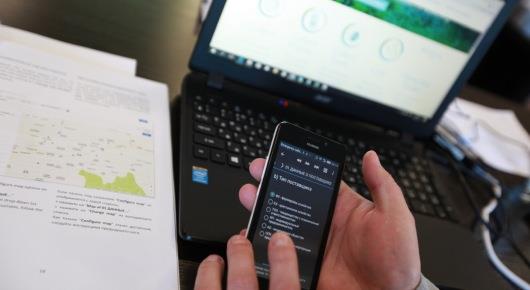Simple IT solution for bottlenecks in Kazakhstan’s dairy industry

A simple, innovative app could become a game-changer for Kazakhstan’s dairy industry – improving the efficiency of the raw milk supply chain.
FAO and the European Bank for Reconstruction and Development (EBRD) have trained milk procurement managers with Kazakhstan’s top dairy companies on Collect Mobile – an open source application for data collection, management, analysis and display that is part of the Open Foris suite.
Once downloaded to an Android smartphone or tablet, a customized version of the Collect Mobile app can be used by dairy companies to map milk procurement routes, monitor and score the performance of their milk suppliers, and pinpoint trouble spots hindering milk quality and yields.
“In this project, we set the ambitious goal of boosting Kazakhstan’s raw milk supply, which is a major bottleneck in the development of the country’s dairy industry,” said FAO agribusiness specialist Inna Punda, referring to the FAO-EBRD project to support a more inclusive dairy value chain.
“Mobile phones and information technology are now part of our lives,” she added. “This is about finding a simple IT solution for a complex problem.”
Milk collection challenges
Most of Kazakhstan’s raw milk comes from small and medium-sized family farms. Milk quality is often poor, availability is seasonal, and distances to dairy plants can span hundreds of kilometres, leading to high transport costs and risk of spoilage.
The country does not have enough milk collection centres to serve all milk producers or meet the demands of milk processors.
A better collection system would benefit dairy farmers, processors and consumers alike. This means more accurate information about existing sources of collectable raw milk – information on volume, seasonal availability, quality characteristics and, most importantly, the growth potential of each supplier.
Building a bridge between suppliers and processors
That’s where Collect Mobile comes in. With the software, processors can geo-locate potential raw milk suppliers using phones or tablets with embedded GPS, collect and analyse data on milk availability throughout the lactation cycle using field-based surveys, and optimize collection routes to reduce costs.
The tool enables fast, intuitive and flexible data collection with on-the-fly diagnosis of what is preventing farmers from producing more and better-quality milk. It can handle large lists of milk producers – ideal for Kazakh dairy companies that rely on hundreds of milk suppliers scattered across the vast country.
Data can easily be exported in common formats, and the immediate compatibility with Google geospatial tools allows for powerful data visualization and easy sharing.
Collect Mobile promotes direct interaction between dairy companies and their suppliers, and enables the companies to better target their support – from advice on improved hygiene and farm management, to herd repair and feed supplements.
“We are confident this technology will build trust between farmers and processors, making the operations of both more profitable and competitive,” Punda said.
Mapping out routes
FAO and the EBRD are working with FoodMaster, a leading Kazakh dairy company and affiliate of Lactalis, the world’s largest dairy products group, to develop a pilot map of the company’s milk procurement basins. It is hoped that this will encourage other Kazakh dairy companies to follow suit.
“FoodMaster only uses high-quality milk to produce its natural dairy products,” said Aida Sapargazinova, Chairperson of the Board of FoodMaster. “Thanks to the FAO-EBRD project, we are confident that we will be able to expand our raw milk intake and have a complete picture of the potential of each region in Kazakhstan.”
Getting the word out
With two training events – conducted in the capital city Astana and in Almaty in the southern part of the country – FAO and EBRD are getting the word out to a wider audience about the benefits of Collect Mobile.
They have trained milk procurement managers from nearly ten of Kazakhstan’s dairy companies, including the country’s top five, which have roughly 40 percent of the market share.
They have developed detailed training manuals in Russian and English on the use of Collect Mobile, and will continue to support Kazakh dairy companies willing to use the technology, through a pool of national experts and in collaboration with the country’s Dairy Union.
“Having more transparent and accurate information on the raw milk supply chain will facilitate investment and policy-making in Kazakhstan’s dairy sector,” said Victoria Zinchuk, Head of Agribusiness Advisory at the EBRD. “A steady flow of high-quality milk will give companies incentives to upgrade and expand their operations. Meanwhile, farmers will be more inclined to modernize their facilities and better manage their grazing lands and milk production practices, knowing they have a reliable market.”
16 March 2017, Budapest, Hungary
